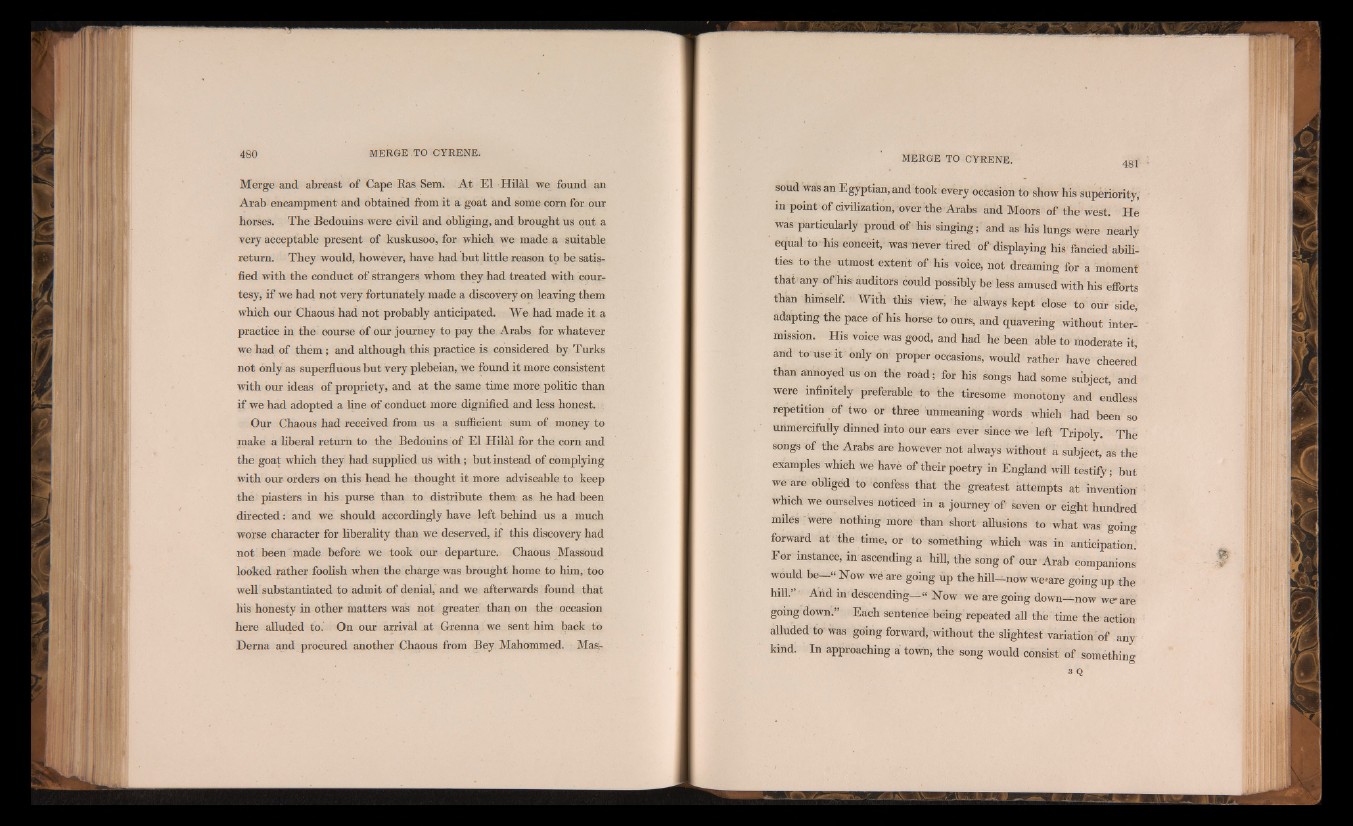
Merge and abreast of Cape Ras Sem. At El Hilal we found an
Arab encampment and obtained from it a goat and some corn for our
horses. The Bedouins were civil and obliging, and brought us out a
very acceptable present of kuskusoo, for which we made a suitable
return. They would, however, have had but little reason to be satisfied
with the conduct of strangers whom they had treated with courtesy,
if we had not very fortunately made a discovery on leaving them
which our Chaous had not probably anticipated. We had made it a
practice in the oourse of our journey to pay the Arabs for whatever
we had of them ; and although this practice is considered by Turks
not only as superfluous but very plebeian, we found it more consistent
with our ideas of propriety, and at the same time more politic than
if we had adopted a line of conduct more dignified and less honest.
Our Chaous had received from us a sufficient sum of money to
make a liberal return to the Bedouins of El Hilkl for the corn and
the goat which they had supplied us with; but instead of complying
with our orders on this head he thought it more adviseable to keep
the piasters in his purse than to distribute them as he had been
directed: and we should accordingly have left behind us a much
worse character for liberality than we deserved, if this discovery had
not been made before we took our departure. Chaous Massoud
looked rather foolish when the charge was brought home to him, too
well substantiated to admit of denial, and we afterwards found that
his honesty in other matters was not greater than on the occasion
here alluded to. On our arrival at Grenna we sent him hack to
Derna and procured another Chaous from Bey Mahommed. Massoud
wàsan Egyptian, and took every occasion to show his superiority,'
in point of civilization, over the Arabs and Moors of the west. He
was particularly proud of his singing;' and as his lungs were nearly
equal to his conceit, was never tired of displaying his fancied abilities
to the utmost extent of his Voice, not dreaming for a moment
that any of his auditors could possibly be less amused with his efforts
than himself. With this view, he always kept close to our side,
adapting the pace of his horse to oürs, and quavering without intermission.
His voice was good, and had he been able to moderate it,
and to Use it only on proper occasions, would rather have cheered
than annoyed us on the road; for his songs had some subject, and
were infinitely preferable to the tiresome monotony and endless
repetition of two or three unmeaning words which had been so
unmercifully dinned into our ears ever since we left Tripoly. The
songs of the Arabs are however not always without a subject, as the
examples which we havè of their poetry in England will testify ; but
we are obliged to confess that the greatest attempts at invention
which we ourselves noticed in a journey of seven or eight hundred
miles were nothing more than short allusions to what was going
forward at the time, or to something which was in anticipation.
For instance, in ascending a hill, the song of our Arab companions
would be—“ Now wë are going up the hill-now we-are going up the
hill.” And in descending—“ Now we are going down—now we* are
going down.” Each sentence being repeated all the time the action
alluded to was going forward, without the slightest variation of any
kind. In approaching a town, the song would consist of something
3 Q